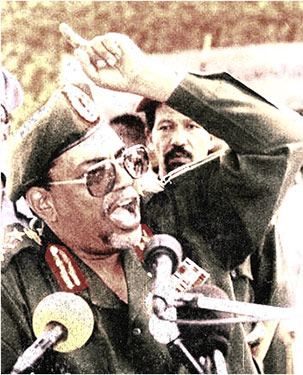Manbij blast heightens contradiction in north Syria
A suicide blast cliamed by ISIS killed 19 people—including four Americans—in the contested north Syrian town of Manbij, even as the Trump White House embarrassingly crows about how the Islamic State has been defeated. But an ISIS resurgence is actually a lesser concern than a US withdrawal setting off a scramble for Syria’s north—and an Arab-Kurdish ethnic war. Most or all of the Kurdish forces seem to have left Manbij, but a contingent of US troops remain in the town, forestalling a reckoning—for now. Both Assad and Free Syrian Army forces are nearby, each waiting to advance on Manbij as soon as the US withdraws. The Assad regime, FSA and Kurdish forces are all mutually hostile. A US withdrawal could mean a power vacuum that sparks a conflagration. (Photo of regime forces outside Manbij via Kurdistan24)




